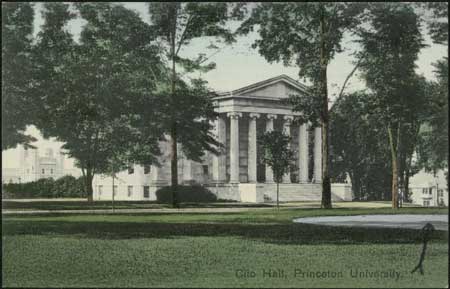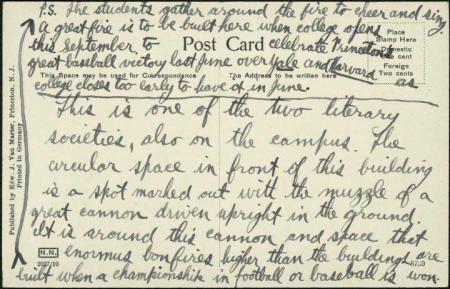This undated postcard of Whig or Clio (“the two literary societies”) bears witness to the tradition of the Big Three bonfire on Cannon Green to celebrate athletic triumphs. The author anticipated an upcoming September bonfire in honor of a past June baseball victory.
Which year? It’s hard to say. Princeton played Yale at Commencement from the 1890s through the 1960s and beat both Harvard and Yale many times during those years. But it must have been before 1952, because the stamp box says “Domestic: One cent” and 1951 was the last year a postcard cost a penny to mail.
Princeton football plays Harvard this Saturday, October 25, in a home game at Princeton stadium, then later takes on Yale in New Haven on Saturday, November 15.
Photo: Historical Postcard Collection


Is the fact that the writer refers to the muzzle a clue?
Was the cannon buried with the muzzle end up at one time, or was he mistaken about which part of cannon is/was visible, since it the breech rather than the muzzle that is currently exposed?
Another football "clash" reported in the journals of Edwin Manners, class of 1877 Princeton, relates (among other things) to so many people watching these same rivals play 100 years ago, compared to the significantly reduced numbers currently.
November 21, 1896
The great foot-ball game between Yale and Princeton came off this afternoon at Manhattan Field, New-York, and resulted happily in Princeton's favor. As a good Princetonian I expected to go, but unhappily the air was chill and a drizzling rain came down. So I stayed at home and was unique. There is sometimes a pleasure in not doing what all the world does. I am not cold; I really have some red blood. At the game I should have caught the enthusiasm and been carried out of myself, and that is well at times, even though it means temporarily being beside oneself and induces a suspicion of buffoonery. The game seems tobe still in the ascendant for interest and popularity; yet looking apart at forty or fifty thousand people, swarmed on banks, gazing intently upon trained athletes struggling fiercely within the lines bring strongly to mind suggestions of a reversion to the brutal combats of the Circus Maximus or Colosseum. Is there not a savagery in this gathering to the fight tobe in at the death? Is foot-ball a distinctive advance or retrogression in civilization? Is it not high time we got over war and the kicking habit? We should do better than that; we should shorten our feet and lengthen our heads. The virtues of the playing-field have been, I fancy, over praised. Let our universities ripen scholars. What is constantly wanted, what is becoming more and more a political necessity to safeguard the nation is trained intellect.